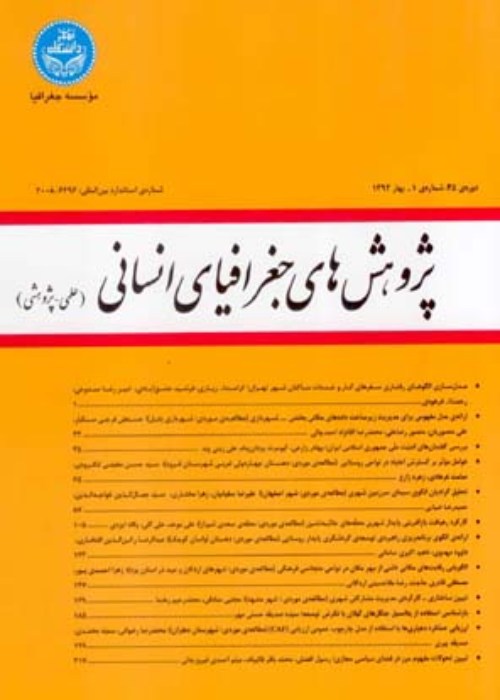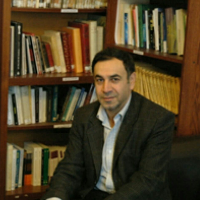Analyzing the Impact of Climate Change and its Challenges and Opportunities on Regional Crisis
Author(s):
Abstract:
Introduction
Talking about controversy and conflict over scarce resources among individuals as well as states is an issue that has long been of interest to scholars and experts of economics, politics, psychology, biology, etc .This is clearly evident especially in view of the realism school and thinkers such as Thucydides, Hobbes, Machiavelli and Followers such as Morgenthau, Waltz, Kissinger, etc. Anarchic international System, state-centered, effort to obtain, maintain and increase the power, rationality and calculation of cost-benefit, struggle to survive and self-reliance are The most important characteristics and components of the realist school in international relations. In this school, states as like as individuals, are looking for their own interests and thus evaluate profits and damages at every actions. Then, if the benefits overtake theirs losses, they will go to war. Since international system is considered as competitive and anarchic, then, chaos, tension, crisis and insecurity will frequently occur around the world. This paper studies the impact of the challenges and opportunities resulting from climate change on the creation and spread of regional crisis between states around the world. It attempts to answer a basic question namely "What will be the future impact of climate change, particularly in the regional-scale crisis?" The hypothesis that has been proposed in response to the question is: "challenges and opportunities rising from climate change first allow the renewal and intensification of chronic conflicts and crisis in tropical areas around the equator, and on the other hand will create the formation of new tensions and crisis in areas near the north and south poles."Methodology
With regard to the purpose of this research that is "analyzing the impact of climate change and its challenges and opportunities on regional crisis", method used in this paper, is descriptive and analytical, which is completed by tables, charts, maps, Statistics and numbers. Also it is done in the framework of realism theory.Results And Discussion
Findings suggest the recent increase in greenhouse gas emissions resulting from both rapid population growths and the intensification of economic and industrial activities has caused climate change on a global scale. Temperature rise, sea level rise and change in precipitations, which are the main consequences of climate change, have been faced human with challenges and some new opportunities. Today, for example the shortage of fresh water and food resources, the outbreak of infectious diseases and migration are challenges which especially have been involved tropical and developing countries around the equator such as southern, northern and central Africa, southern sections of north America (Mexico and Central America), northern zone of south America and red sea into the Middle East and Mesopotamia, where it connects with Central Asia, including Turkey, Iran, Kazakhstan and western sector of South Asia, East Asia, north of the Tibetan highlands, in Xinjiang and the Gobi desert. In contrast, it is anticipated that in the coming decades, melting massive icebergs and permanent glaciers and also the reduction of extreme cold in the polar regions, particularly the Arctic will prepare new opportunities and favorable conditions (such as the extraction of valuable mineral sources, undiscovered energy reserves, animals, food, and also the provision of access to virgin lands and new communication ways) for living in these areas. Developed countries located around the North Pole, such as northern sector of North America and Nordic countries such as Denmark (Greenland), Iceland, Norway, Sweden and Finland, Canada and the United States (Alaska) will benefit more than other states in Central Asia such as Mongolia, Siberia, Xinjiang, Tibet and northern china and Russia and areas previously governed by the Soviet Union. Obviously these challenges and opportunities each will result to the intensification of existing hostilities, conflicts and tensions and will cause a new series of hostilities between states, with varying degrees of severity, amplitude and depth. Thus, regional changes will been gendered and international security will face the new challenges with serious threats.Conclusion
Although it seems that the type and intensity of conflicts and wars caused by climate change in different regions is not the same and especially countries located in the Arctic regions benefit of the opportunities and benefits of global warming more than other regions, Yet, Whatever the temperature increaser, the threats and damages greater and the opportunities less. So these threats and damages will not remain an opportunity to take advantages of opportunities, and eventually most of the world will involve in crisis and then tensions will be universal, and some regions will be safe of its lethal effects and consequences.In fact, the occurrence of natural disasters such as the devastating earthquake in Bam in 2003, the Indian Ocean Tsunami in 2004, American Katrina Hurricane in 2005, the Myanmar Cyclone in 2008, Pakistan floods, record heat wave in Russia, Vesuvius activity in Iceland, Congo, Guatemala, Ecuador and Philippines, all in 2010 and the recent earthquake and then tsunami in Japan in 2011 proved that even developed countries cannot be resistant against the threats of climate change. These are just a few examples of natural disasters that have occurred as a result of global warming and have transformed concept of security in the 21st century into a new concept. Because today, unlike the past, the concept of security in the international system is not defined with boundaries, ranges and borders, and it is not only supported by military also the threat against it comes from our own not others. So fight against this enemy and eliminate this threat, will require broad cooperation between states. It is especially necessary that superpower and developing states cancel many theirs large industrial and commercial projects. Otherwise, you should look forward crises and conflicts resulting from climate change in most regions of the world by and by.
Keywords:
Language:
Persian
Published:
Human Geography Research Quarterly, Volume:48 Issue: 95, 2016
Pages:
69 to 87
magiran.com/p1515537
دانلود و مطالعه متن این مقاله با یکی از روشهای زیر امکان پذیر است:
اشتراک شخصی
با عضویت و پرداخت آنلاین حق اشتراک یکساله به مبلغ 1,390,000ريال میتوانید 70 عنوان مطلب دانلود کنید!
اشتراک سازمانی
به کتابخانه دانشگاه یا محل کار خود پیشنهاد کنید تا اشتراک سازمانی این پایگاه را برای دسترسی نامحدود همه کاربران به متن مطالب تهیه نمایند!
توجه!
- حق عضویت دریافتی صرف حمایت از نشریات عضو و نگهداری، تکمیل و توسعه مگیران میشود.
- پرداخت حق اشتراک و دانلود مقالات اجازه بازنشر آن در سایر رسانههای چاپی و دیجیتال را به کاربر نمیدهد.
In order to view content subscription is required
Personal subscription
Subscribe magiran.com for 70 € euros via PayPal and download 70 articles during a year.
Organization subscription
Please contact us to subscribe your university or library for unlimited access!



